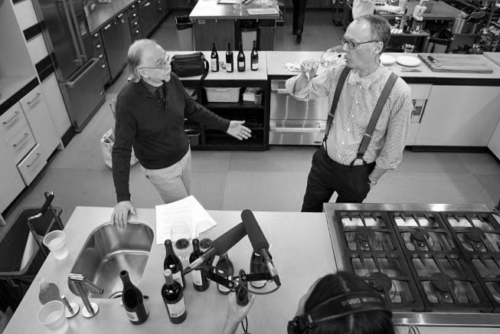
There was a time in our wineshop when we took pains to identify wines made with organically farmed grapes or via the method known as biodynamics. And there was good reason for this. We’re located in a community with a high level of awareness about food-supply issues. Our clientele wants to know where its food comes from and how it’s produced and has similar expectations for the wine it consumes.
Lately, though we’ve done away with this system, and in a moment I’ll tell you why. But first I’d like to address a question I’m regularly confronted with when tasting with guests at Formaggio: whether organic and biodynamic wines taste different from wines made with grapes not farmed according to these disciplines.
The short answer is no. While a vintner may tell you that he or she notices subtle differences in his or her wine after having adopted an organic or biodynamic approach, the way the grapes are grown is not going to make the kind of difference a consumer will readily notice. “But,” guests at the tasting table regularly tell me, “I had a natural wine at such and such a restaurant and it tasted dramatically different from conventional wine. The sommelier told us it was farmed organically.”
Here’s the disconnect: Natural wines begin with organic or biodynamic farming, but they go a step further. It’s not the grape farming that makes the difference but the work in the cellar, post-harvest, that is having an effect.
Under the “nothing added, nothing taken way” approach adopted by winemakers using a naturalist approach, grapes will have been be subjected to minimal interventions as they make their way from fruit to wine. Often this will mean low or no additions of sulfur dioxide—a ubiquitous additive that provides protection against both oxidation and the development of certain kinds of bacterial organisms. Sulfur dioxide is especially valued in the making of white wines that depend on very limpid hues and bright, fresh flavors for their market appeal, since it retards the processes that would otherwise result in browning and a diminution of fresh fruit flavors.
Natural wines begin with organic or biodynamic farming, but they go a step further.
Wine drinkers exposed to naturally made wines are just now learning how much conventionally made wines owe to the use of sulfur and to other additives and treatments in the winery. We’re also learning that surviving biology in the bottle can add aromas and flavors to wine that we haven’t experienced before—some likeable and some less so. I like to describe these characteristics as natural wine affect.
So, back to the reasons we stopped identifying wine as organic or biodynamic on our shelves. First, singling out one kind of wine for special treatment suggests that other wines on the shelf are of a second order of quality. In fact, there are several good reasons why a conscientious winemaker might choose not to practice organically 100 percent of the time. One has to do with location. In dry, sunny locales with good air circulation, molds and mildews are much less threatening than in places where rain and humidity are more common. It’s less risky to farm organically in Sicily than in Bordeaux or New England, for example.
Then there are small holders who don’t see the point in expending the time and money on applying for organic certification. One of the things that is not generally known is that the largest organization offering certification for biodynamic practice charges a per-bottle royalty. It’s easy to understand why this would be a disincentive.
Finally, once you’ve achieved certification, you have to live with the limits it puts on your ability to respond to a truly threatening situation. It doesn’t seem reasonable to me to expect a family to lose an entire vintage rather than reluctantly resort to a chemical spray in a genuine emergency. In our view, decisions of this sort are best left to the folks who are there, on site, and have skin in the game. After all, it’s their livelihood we’re talking about.
We want winemakers to behave responsibly within the localized conditions they find themselves confronting. For some this will mean practicing organic or biodynamic farming (but perhaps not being certified as such). For others it will mean taking a cautious, reasoned approach to the use of chemical sprays as necessary. I don’t think that an otherwise responsible winemaker should be punished for occasionally having to resort to nonorganic practice.
So, should you only drink wine made from certified organic or biodynamic fruit? It’s up to you, of course. But in the end, the only way to guarantee that our wine is both delicious and responsibly produced is to deal only with skilled, responsible producers.
Stephen Meuse can be reached at stephenmeuse@icloud.com